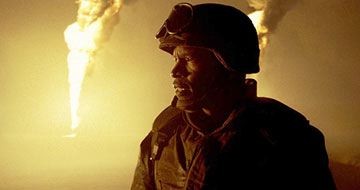Boy soldiers

If Vietnam, with its baffling, Venus-flytrap landscape, is the perfect dramatic background for an existential drama, the Gulf War would appear to be an ideal setting for an existential comedy: so many servicemen all suited up but with nowhere to go and nothing to do. That’s how David O. Russell’s great 1999 film Three Kings began. It took the hormone-crazed young Americans in the gulf as its starting point and developed a quest story in which the search for illicit riches shifted into a moral imperative to save the lives of a band of nomads on the run from Saddam Hussein.
By contrast, Jarhead, directed by Sam Mendes, has little humor and no dramatic or moral arc. It depicts a generation of young marines who are evidently so stunted by a sexed-up, video-game culture that they’re beyond being educated. They’re frat boys trained to channel insensitivity into violence—and the war is over before they even get to shoot.
The notion that America is morally vacant and ultimately psychotic underlies all of Mendes’s movies. The trouble is, his America isn’t a place where any of us has actually been. His vision of life in the suburbs, American Beauty (which came out the same year as Three Kings), where sexually frustrated executives take jobs at McDonalds and smoke weed all day and misunderstood teenage girls fall in love with their stalkers, doesn’t even work as black comedy because it is so insanely inaccurate about its subject matter.
His follow-up, Road to Perdition, is a threadbare gangster melodrama in which every violent confrontation is pumped up to imply that it is the American dream that is under attack. Mendes wants to make grandiose statements, but he falls into left-wing clichés. Jarhead’s tone of righteous indignation will work only for moviegoers who have never seen one of the two dozen or so Vietnam pictures that came out between the late 1970s and early ’90s.
Though Jarhead is adapted from Anthony Swofford’s memoir, nothing in it feels like it sprang from someone’s experience. Mendes isn’t interested in characters either. In the lead role, playing Swofford, all Jake Gyllenhaal is asked to do is scream louder and get more enraged than the men around him. Most of the actors, including Chris Cooper and Dennis Haysbert as senior officers and Ernest Ozuna as a drill sergeant lifted from Stanley Kubrick’s Full Metal Jacket, are playing cartoons. Only Peter Sarsgaard (by virtue of his intelligence) and Jamie Foxx (by virtue of his charisma) manage occasionally to suggest more.
Jarhead is swollen and monotonous. The dialogue by William Broyles Jr. is mostly declarative sentences punctuated by obscenities. The unleashed adolescent antics of the marines, fueled sometimes by alcohol and always by boredom and sexual deprivation, are loud, undifferentiated and poorly staged.
There are two striking images: one of oil fires spouting like geysers across the desert, and one of Gyllenhaal and Sarsgaard trekking down a sand dune that is so eerily lit it looks lunar. Otherwise the film (shot by the gifted Roger Deakins) is overexposed and bleached-out in the daytime scenes and underlit in the night exteriors. As a result, visual contrasts disappear. A horse roams onto the screen, lacquered in oil, and in another scene one of the men defiles a corpse, but since the viewer has to deduce what’s going on, the shock value of these moments is lost.
Jarhead is as inept as it is shrill. Ignore the hype that proclaims that this movie has something important to tell us about the Gulf war (or, by implication, the Iraq war or war in general). Rent Three Kings instead.



